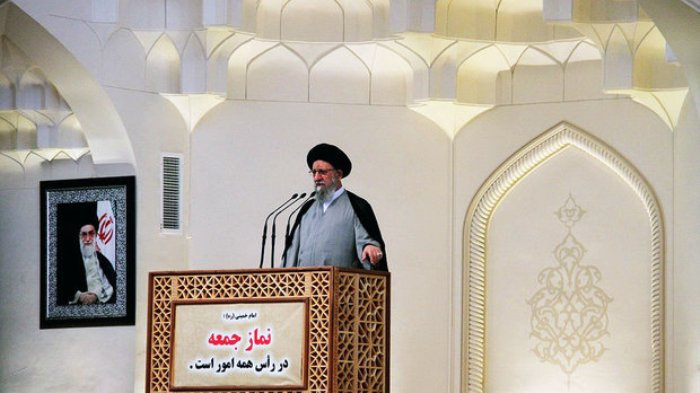Iran’s Friday Prayers: Follow-ups to JCPOA

(Ayatollah Nourmofidi, one of the remaining handful of pro-Reform Friday prayers' leaders; Photo: Mehr News)
Friday prayers around the country were dominated by discussion of the JCPOA and its aftermath.
In Tehran, head of the regulatory legislative body, the Guardian Council, Ayatollah Jannati, who rubberstamped the JCPOA after its ratification by the parliament, announced that the case is now closed, and should not be put to further public discussion. "The JCPOA [case] is over and it should not be laid bare in public sessions. Good or bad, few or many, we should view it as a concluded case and follow our rights [as sanctioned] in the JCPOA."
While thanking Majles for its examination of the Joint Comprehensive Plan of Action, Jannati clarified that the Iranian parliament had a marginal role and the document was basically approved by the National Security Council, though he added that the JCPOA still needs final approval by the Supreme Leader.
Jannati's major emphasis was about the post-adoption phase of the JCPOA however. "We should be careful," he said. "The other side is an oath-breaker and will make a thousand excuses to renege on its promises." He also added that the success of the JCPOA is determined by whether it results in the lifting of sanctions or not.
The octogenarian ayatollah was as straightforward as ever in his remarks: "I hope I'm making a mistake; but in my opinion, the JCPOA and achievements gained by the other side was [only] their first step, and if we do not resist, they will push for other issues. They will ask us to recognize Israel … and sever relations with Hizbullah, Syria and Iraq."
In Gorgan, in northern Iran, Ayatollah Seyyed Kazem Nourmofidi, one of the handful of Reformist Friday prayers leaders, was more supportive of the JCPOA ratification. Nourmofidi reminded his congregation that the process that resulted in drawing up the JCPOA was done under the supervision of the Supreme Leader, and would have not been achieved had it not been for his approval. He also stated that in the post-JCPOA era, there are no excuses and the country's efficient human capital should be used in the optimal way.
In Yazd, in central Iran, Friday prayers leader and member of the Guardian Council Mohammad-Reza Modarresi Yazdi echoed his senior Ayatollah Jannati. "Regardless of the correctness or incorrectness of the path trodden, we are now at a phase where we should use our best thoughts and designs." Meanwhile, he added that the Guardian Council, in charge of examining the compliance of Majles' bills with the Constituion and shari'ah, has done its duty, and conferred the rest of the JCPOA responsibility to the National Security Council.
In Ahwaz, in southwesterm Iran, Friday prayers leader Ayatollah Mohsen Heydari was less skeptical, arguing that the parliament's JCPOA draft bill ratification and approval by the Guardian Council, the bill has now turned into a "national, legal, and Islamic law" that everyone should follow.
"Those who were against the JCPOA no longer have the right to oppose it," he said. "But they gave their informed opinion and that will be recorded in history." Ayatollah Heydari also added that "revolutionary and national interests" call for adherence to the parliament's JCPOA law and putting aside all differences.
In the meantime, he warned about any likely plans by the enemy for cultural, economic, political or military infiltration.
In Shiraz, Ayatollah Imani called for unity of the nation in spite of divisive issues such as the JCPOA. "Even if we have objections against the JCPOA … we should express it in a correct language which the enemy cannot abuse," he said. He also stated that the JCPOA bill is now ratified and should be treated as a law. In the meantime, he warned about the enemy's future plans: "the enemy wants to contrive infiltration through these negotiations. The enemy's think tank has emphasized the importance of patience and is thinking of Iran in 2025 and 2030. They want to make the ground fertile for 15 years from now … so we should be vigilant."

